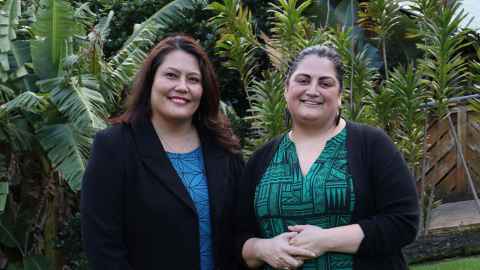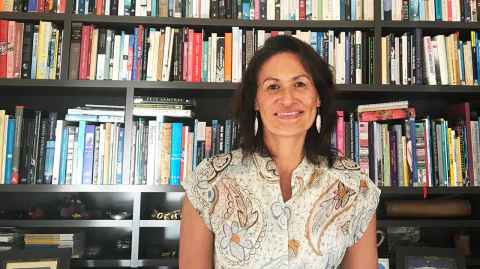Pacific scholars launch special issue of prestigious journal
19 June 2023
The Journal of the Polynesian Society, now re-branded as Waka Kuaka, has launched a special double issue, with a focus on Pacific research methods and methodologies

Waipapa Taumata Rau, the University of Auckland has officially launched the first Special Issue of Waka Kuaka – the new Journal of the Polynesian Society, titled: Re-visioning Pacific Research Methodologies.
The special edition explores both existing Pacific research methodologies and new approaches, while discussing their global relevance beyond the shores of Aotearoa New Zealand.
The launch marks a historical moment where this generation of scholars have been trained after significant challenges to Western models of knowledge and research, including feminist and Indigenous epistemologies, culturally appropriate research approaches, and other shifts that recognise place-based and local knowledges.
President of the Polynesian Society and director of the James Henare Māori Research Centre, Associate Professor Marama Muru-Lanning, opened the launch, noting its long and prestigious history since its creation in 1892.

The Journal of the Polynesian Society is published by one of the country’s oldest academic communities. Founder Elsdon Best’s motive was to record the culture, customs, and history of Māori and Polynesian peoples as their populations were in sharp decline.
Some feared that Māori as a community might not survive into the 20th century.
“It now seems that we have come full circle,” Muru-Lanning says.
“It is a great privilege as president of the society to open our whakanui and launch the special issue.
“The collection of articles unveils the works of emerging Pacific scholars across the Pacific region, Aotearoa and Australia, as well as early career experts, with research passions and teaching aspirations.”
Waka Kuaka is guest co-edited by Pacific scholars Dr Lisa Uperesa and Dr Marcia Leenen-Young.
It includes ethical frameworks and advice for working collectively with Pacific communities and has been guided by priorities of relationality, reciprocity and responsibility, grounded in Pacific world views.
Uperesa says it’s provided the opportunity to further refine, improve, and develop these approaches. They have also introduced a unique in-person double peer review process centred on collaboration and relationality.
For Pacific scholars and communities, Uperesa says these approaches and frameworks are sites of decolonisation and re-indigenisation.
“This double special issue is about providing space for robust, critical engagement with Pacific research methods, while centring on Pacific values such as fa’aaloalo (respect, reciprocity), aroha (love and charity), and tautua (service) in the review process.”
“This is aimed to address shortcomings in usual journal review processes by providing a different model of publishing in academia, while usefully reconfiguring Pacific methods and methodologies for today.”
“Those of us who were trained in an earlier time didn’t have the benefit of this work that we have today. We had to work with research approaches and tools that were not made for our communities," she says.
“We remade them, adapted them through trial and error, to fit what it was we were trying to do.
“I have great respect for the early authors who developed the field of Pacific research methodologies and carved this path for us to follow, including some of our own, like Associate Professor Melani Anae and Associate Professor Tamasailau Suaalii-Sauni,” Uperesa says.
Those of us who were trained in an earlier time didn’t have the benefit of this work that we have today. We had to work with research approaches and tools that were not made for our communities.
The unique double peer-review process also involved gathering contributors together with senior scholars (Associate Professor Vili Nosa, Associate Professor Yvonne Underhill-Sem, Dr Cherie Chu-Fuluifaga, and Dr Sereana Naepi) at the University’s Fale Pasifika to go through a kanohi ki te kanohi collaborative process of review.
Online wānanga were also held to continue the writing process and strengthen connections, which were supported by the Faculty of Arts Research Development Fund.
Leenen-Young says it not only built relationships but supported academic rigour.
“The key contributions are divided into three themes: a call for deeper recognition of place and context in how we remain in good relation when on other Indigenous peoples’ lands, and thinking carefully about how we use models and metaphors sourced from everyday practices in the Pacific,” Leenen-Young says.
"We offer a critical reflection on using existing methods and methodologies in new contexts, including working with youth and Pacific protocols in Tāmaki Makaurau.
“We look at maintaining respectful vā when researching in the digital space with Pacific communities, applying the Fijian vanua research framework when working in villages and extending it further with iTaukei values, using approaches inspired by tīvaevae and engaging in talanoa, and balancing community expectations and individual responsibilities while doing things like PhD.”
The contributors span education, health, anthropology, history, development studies, and Pacific studies disciplines, she says.
“Early scholars gave us a vocabulary to understand misalignment with mainstreamed academic approaches and offered some guideposts to find a different way of doing work with our communities.
“When we talk about Pacific-led research we’re talking about using the tools developed at university and in academia to do work that helps our communities. That is the gap that many of our contributors are working into – taking what they have learned to work more effectively in, to empower our communities.
"How might we, together, re-vision Pacific research methods and methodologies for this time and place? And they answered the call brilliantly.”
Leenen-Young says she hopes the collection can provide teaching tools toward greater understanding, clarity and intentionality with Pacific research methods and methodologies.
People can purchase a subscription to the journal which is now completely online here.
Media queries
Kaitohutohu Pāpāho Māori, Moana nui a Kiwa
E: te.rina.triponel@auckland.ac.nz